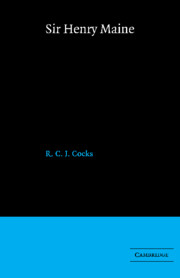4 - AFTER ‘ANCIENT LAW’
Published online by Cambridge University Press: 29 September 2009
Summary
INDIAN VILLAGES AND ENGLISH UTILITARIANS
An enthusiasm for Indian topics formed a consistent theme to Maine's writing: between the time of his early contributions to the Saturday Review in the mid-1850s and the publication of his last book in 1884, he wrote about the subcontinent in vivid terms. This fascination was in part the product of the subject's intrinsic interest; but in part, too, it was the product of Maine's pleasure in attacking the parochialism of his fellow Victorians: and this was so whether their prejudices arose out of some form of national intolerance, or a narrow vision of the common law, or religious dogmatism, or simple ignorance on any matter of any sort. For example, of Buckle's History of Civilisation he observed that the author
has derived all the distinctive institutions of India and the peculiarities of its people from their consumption of rice. From this fact, he tells us, that the exclusive food of the natives of India is of an oxygenous rather than a carbonacious character, and it follows by an inevitable law that caste prevails, that oppression is rife, that rents are high; and that custom and law are stereotyped. The passage ought to be a caution against over-bold generalisation; for it unfortunately happens that the ordinary food of the people of India is not rice.
In contrast, Maine was much more cautious in his use of generalisations relating to India. His colourful pronouncements were linked to qualifications and references to what was not yet known.
- Type
- Chapter
- Information
- Sir Henry MaineA Study in Victorian Jurisprudence, pp. 79 - 100Publisher: Cambridge University PressPrint publication year: 1988



